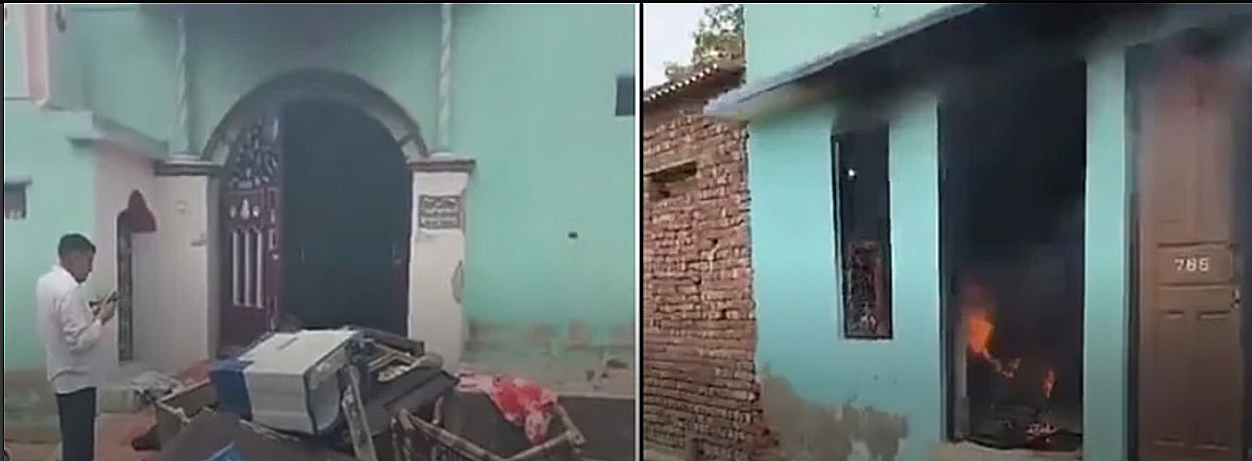
Elham Asaad Buaras
Two homes belonging to a Muslim family were ransacked and set on fire in Dhani Mahu, a village in the northern Indian state of Haryana, on July 6, in what appears to be a religiously motivated attack triggered by reports of an interfaith relationship.
Witnesses and video footage shared online show a group of around 15 to 20 masked men arriving with hammers. They dragged the family’s belongings out of the homes before setting the structures ablaze and fleeing with valuables, including motorcycles, a television, and other household items. The family was not present during the attack, which residents said lasted less than half an hour.
“We received information about the houses being set on fire. Firefighters were rushed to the spot and managed to douse the flames,” said Bhiwani District Police Chief Varun Singla. “We have identified some suspects, and a police team is working to apprehend them.” Images taken after the incident show the scorched remains of the homes, with burned furniture and personal items strewn outside.
While authorities say the motive is under investigation, residents believe the attack was in retaliation for the reported elopement of a Hindu woman from the neighbouring state of Rajasthan with a Muslim man from Dhani Mahu. Earlier that day, a village council, or panchayat, was reportedly held to discuss the relationship. Soon after, rumours began circulating about “love jihad”—a term used by Hindu nationalist groups to allege, without evidence, that Muslim men intentionally seek relationships with Hindu women to convert them to Islam. The concept has no legal basis but has become a source of increasing social tension in India.
“There was no provocation from our side,” said a relative of the affected family, who spoke on condition of anonymity. “This has been blown out of proportion by misinformation and religious bias. We have lived here peacefully for years.”
Following the incident, local authorities deployed additional police to the area to prevent further violence. A criminal complaint has been registered under multiple sections of Indian law, including charges of arson, theft, and unlawful assembly. The family remains displaced although officials say they have been offered police protection if they return.
“We are closely monitoring the situation and have increased patrolling in the area,” added Police Chief Singla. “Anyone found to be involved will be prosecuted under the strictest provisions of the law.”
Still, human rights advocates and civil society groups have criticised the delay in arrests and the lack of public condemnation from political leaders.
“The term ‘love jihad’ is a dangerous conspiracy theory used to vilify Muslim men and criminalise interfaith relationships,” said Nadeem Khan, convenor of United Against Hate, a New Delhi-based rights group. “What happened in Bhiwani is not an isolated case but part of a broader climate of impunity and religiously charged violence.”
Prominent Muslim organisations, including Jamiat Ulama-i-Hind and the All India Muslim Majlis-e-Mushawarat, along with civil rights groups such as the People’s Union for Civil Liberties (PUCL), have denounced the attack and called for swift justice. In a joint statement, United Against Hate and PUCL demanded a judicial inquiry, compensation for the affected families, and the immediate arrest of those responsible. “This attack is a direct consequence of unchecked hate propaganda and a culture of impunity,” the statement read. “The government must act decisively to restore public trust and ensure the safety of all religious communities.”
This latest incident adds to a troubling pattern of communal violence in the region. In February 2023, the same district, Bhiwani, was the site of the lynching of two Muslim men by suspected cow vigilantes—self-appointed groups who claim to protect cows, which are considered sacred in Hinduism, often by violently targeting Muslim cattle traders. Human rights organisations have repeatedly cited Haryana as one of India’s hotspots for targeted violence against religious minorities, pointing to systemic failures in law enforcement and a lack of political accountability.
(Photo credit: Hindutva Watch/CC)
Notice: This article is published exclusively online and does not appear in the page-flip edition.


